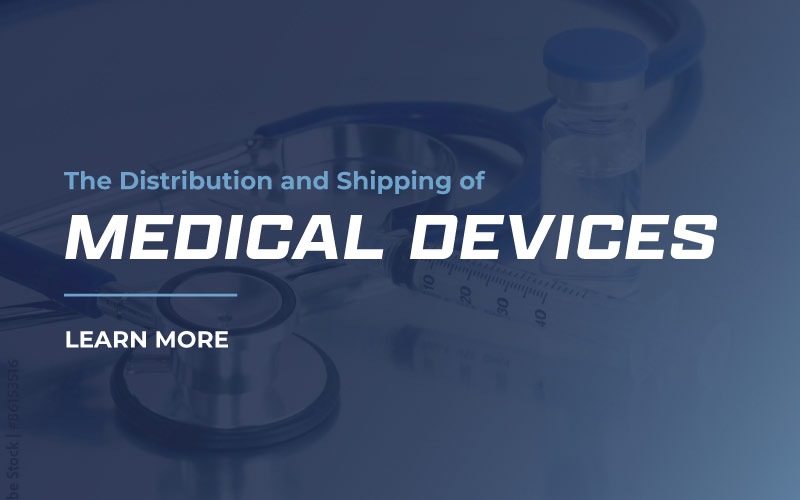Medical device distribution and shipping is the process of transporting and delivering medical devices from manufacturers to hospitals and other healthcare facilities. This process is critical for ensuring that hospitals can access the necessary medical devices to provide quality care to their patients.
In this blog, we will explain all things medical device distribution and shipping, including the following:
- Medical device classifications
- The types of devices shipped
- Things to consider when choosing a provider
- Best practices
Let’s start with understanding more about medical device classification and things to look out for when shipping devices.
Medical Device Classification
Medical devices are categorized into four classes by the US Food and Drug Administration (FDA). Class I devices represent the lowest risk, while Class IV devices represent the highest risk.
Examples of commonly shipped medical devices include bandages, blood pressure cuffs, infusion pumps, X-ray machines, pacemakers, cardiac stents, hip implants, heart valves, artificial larynxes, lasers, radiotherapy systems, and implantable defibrillators.
Streamlined operations can help hospitals save time and money by improving their inventory control. With better inventory control, hospitals can reduce medical device costs by avoiding overstocking or understocking.
Medical device distribution and shipping can increase patient safety by ensuring that hospitals have access to properly functioning medical devices. Improved patient satisfaction is possible when patients know that they have access to the latest medical technologies.
Types of Medical Devices Commonly Shipped
There are four classes of medical devices classified by the FDA. Examples of commonly shipped medical devices in each class include:
- Class I: Bandages, tongue depressors, hearing aids, surgical gloves
- Class II: Blood pressure cuffs, infusion pumps, X-ray machines, pacemakers
- Class III: Cardiac stents, hip implants, heart valves, artificial larynxes
- Class IV: Lasers, radiotherapy systems, implantable defibrillators
It is important for hospitals to be aware of the different types of medical devices available and understand which class each device falls into in order to ensure that they are purchasing the appropriate device for their needs.
Factors to Consider for Medical Device Distribution
When selecting a provider for medical device distribution and shipping, there are several factors that hospitals and labs should consider.
Speed of Delivery
Delivery speed and reliability should be one of the top priorities; providers should have the ability to deliver medical devices quickly and reliably in order to support patient care.
Medical Industry Experience
Hospitals should also ensure that their chosen provider has experience packaging and handling delicate medical devices with care.
Packaging
The packaging should be designed to protect the device from shock, vibration, and other environmental factors during transit.
Regulatory Compliance
It is also important to confirm that the provider is compliant with all relevant regulatory requirements for labeling, documentation, tracking, and storage of medical devices.
Best Practices for Medical Device Distribution
When reviewing your medical device distribution procedures, keep in mind the following industry best practices.
Labels
Proper labeling is essential for successful medical device shipment. Labels should include the manufacturer’s name, product name/number, expiration date, lot number, and any other required information. Additionally, labels should be securely affixed to prevent them from falling off during shipping.
Tracking
All shipments should also be tracked in real-time and documented properly to ensure accuracy and avoid delays.
Temperature
Temperature control may also be necessary for some medical devices. Providers should have experience with temperature-controlled shipping solutions in order to ensure the safety of the device.
Consider Stat Experts for Medical Device Distribution
Medical device distribution and shipping can offer numerous benefits for hospitals including streamlined operations, improved inventory control, reduced costs, increased patient safety, and improved patient satisfaction.
When selecting a provider for medical device distribution and shipping, it is important to consider factors such as delivery speed and reliability, packaging and handling capabilities, and regulatory compliance. Stat Experts provides all of this experience and much more! We care about the success of your hospital and act as a partner in providing the best patient care possible.
Contact Stat Experts today to learn more about medical device distribution and how we can streamline your hospital’s operations.


